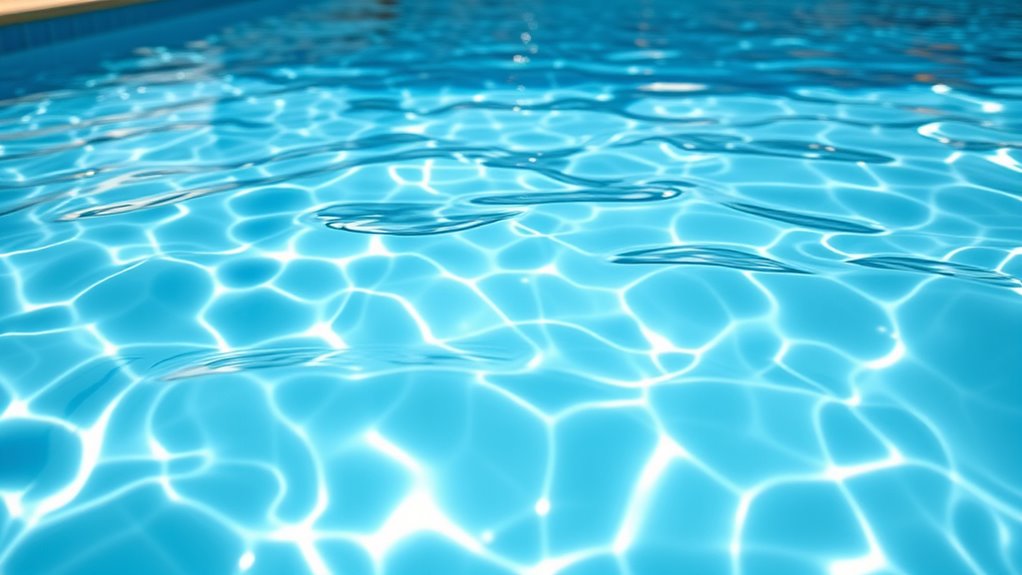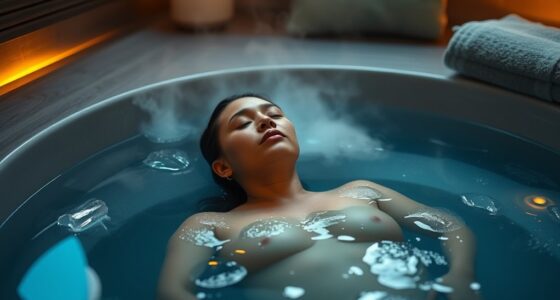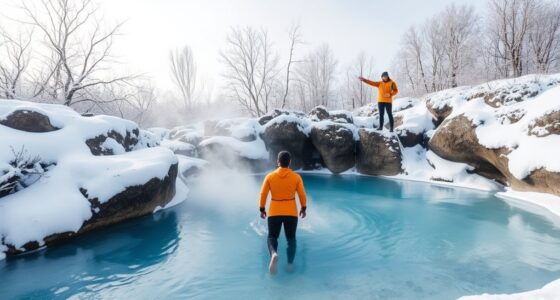Many believe hot water always equals better relaxation, but excess heat can cause discomfort or skin issues. Cold water isn’t automatically safer; it can lead to shock or hypothermia if misused. Water temperature impacts blood flow, muscle performance, and disease risk more than most think. Safety for children and seniors depends on proper temperature control. If you want to uncover the truths behind these myths and improve your hydrotherapy routine, you’ll find valuable insights ahead.
Key Takeaways
- Hot water does not always mean better relaxation; excessive temperatures can cause discomfort and skin damage.
- Cold water isn’t always ideal for recovery; it may hinder muscle repair and cause shock if used improperly.
- Proper water temperature optimizes benefits like circulation and detoxification while minimizing risks such as burns or hypothermia.
- Waterborne pathogens grow faster in warm water, so temperature control is key to maintaining water safety and preventing infections.
- Vulnerable populations like children and seniors require careful temperature adjustments to avoid burns, hypothermia, or safety hazards.
The Myth That Hot Water Always Means Better Relaxation
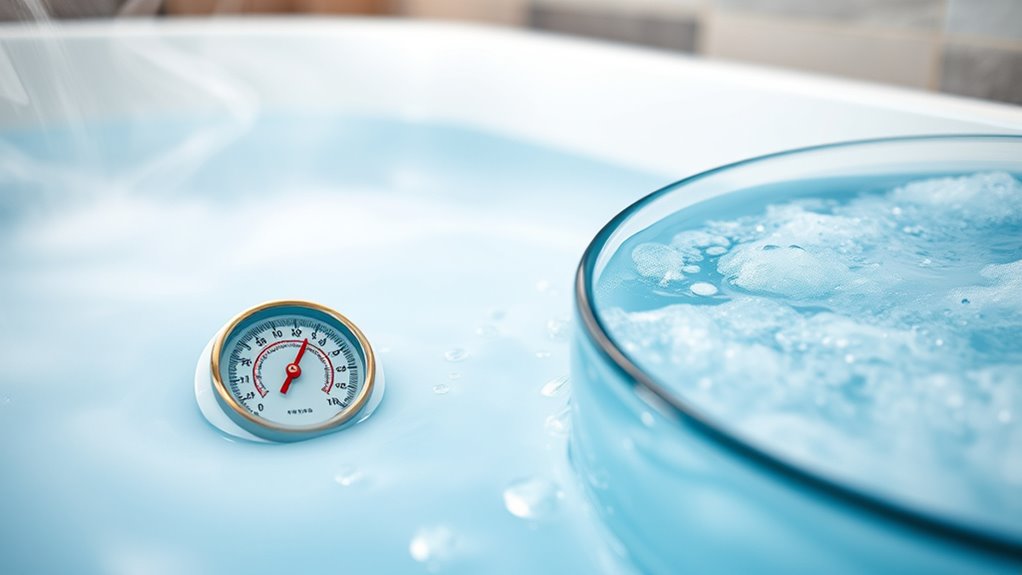
Many people believe that hotter water always provides the best relaxation, but this isn’t necessarily true. This idea stems from hydrotherapy myths and water temperature misconceptions that equate higher heat with better stress relief. While warm water can ease muscle tension, excessively hot water might cause discomfort or even skin irritation. Your body responds differently to temperature: too hot, and you risk dehydration or dizziness; too cold, and relaxation might be harder to achieve. It’s important to find a balance that suits your comfort level, rather than assuming hotter is always better. Understanding these misconceptions helps you make smarter choices, ensuring your water therapy is both effective and safe. Remember, relaxation isn’t just about heat—it’s about what feels best for your body. Additionally, using the right water temperature targets can optimize the benefits of hydrotherapy without risking adverse effects.
Cold Water Is Always Safer Than Hot Water
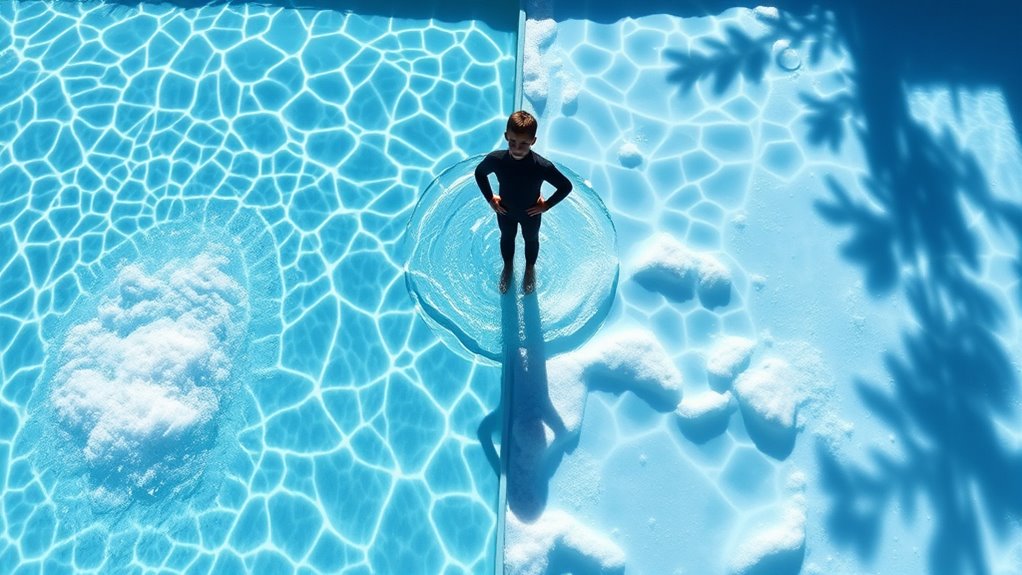
Many assume that cold water is always safer than hot water, but that’s not necessarily true. Cold water can pose risks like shock or hypothermia, while hot water offers benefits such as improved muscle relaxation. Understanding these misconceptions helps you make safer choices when it comes to water temperature. Additionally, being aware of digital literacy can help families navigate online safety and responsible water safety practices for children.
Cold Water Risks
Is colder water always the safer choice? Not necessarily. Cold water risks can be significant, especially if you use hydrotherapy techniques or engage in aquatic exercise improperly. Sudden immersion in very cold water can cause shock, hyperventilation, or even cardiac stress, particularly if you’re unprepared. For some, cold water can lead to hypothermia more quickly than expected, especially in prolonged exposure. While many believe cold water offers quick relief or safety, it can mask symptoms of overexertion or health issues. Always approach cold water with caution, gradually acclimate, and listen to your body. Remember, the safety of cold water depends on proper technique and awareness, not just temperature alone. Additionally, understanding water temperature targets can help mitigate risks and improve safety during aquatic activities.
Hot Water Benefits
While cold water often gets attention for safety, hot water offers notable health benefits when used properly. Hot water benefits include improved circulation, relief from muscle tension, and enhanced detoxification. Proper water temperature health can boost your immune system and reduce stress.
Consider these hot water benefits:
- Stimulates blood flow, supporting overall cardiovascular health
- Eases muscle soreness and joint pain, promoting faster recovery
- Helps open pores, aiding in deep cleansing and detox
Using hot water within safe limits maximizes these advantages without risking burns. Understanding the right water temperature health benefits allows you to enjoy the therapeutic effects safely. Remember, hot water can be a powerful tool for wellness when used thoughtfully and carefully.
Temperature Misconceptions
Although hot water offers health benefits when used correctly, there’s a common misconception that cold water is always the safer choice. In reality, temperature alone doesn’t determine safety; factors like hydration balance and pH levels matter. Cold water can sometimes cause shock or reduce circulation, especially if it’s too cold. Hot water, if not excessively hot, can promote relaxation and better hydration without disrupting pH levels. Additionally, understanding how creative practice influences our perceptions can help us better assess water safety.
The Belief That Water Temperature Doesn’t Affect Blood Circulation
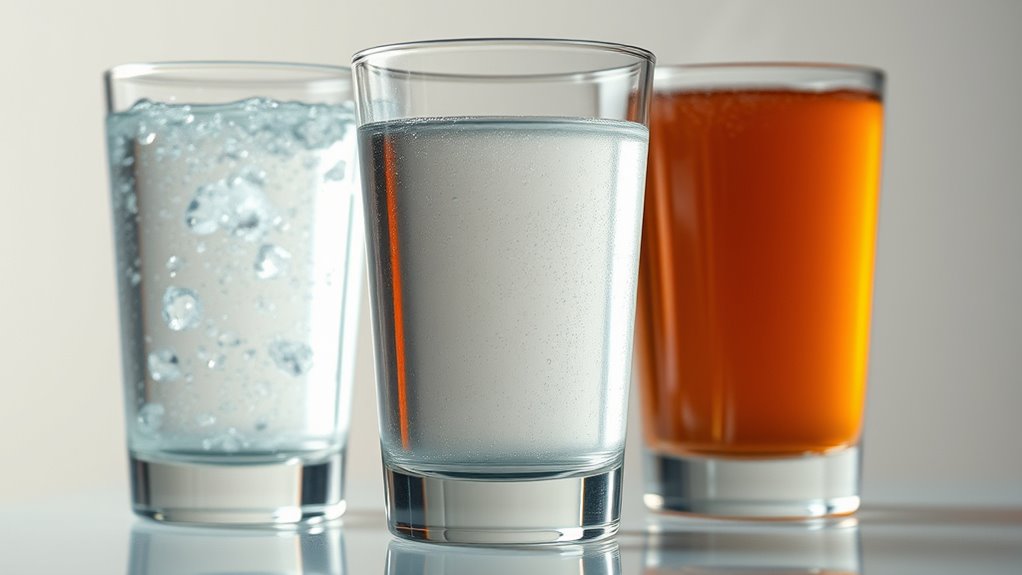
Many people believe that water temperature has no impact on blood circulation, but this is a misconception. The temperature of water can profoundly influence your blood flow and overall circulation impact. When you dip into warm water, your blood vessels expand, encouraging better circulation. Conversely, cold water causes vasoconstriction, reducing blood flow temporarily. This fluctuation affects how efficiently oxygen and nutrients reach your tissues. Additionally, the use of eye patches can help soothe and reduce puffiness around the eyes, especially after exposure to temperature extremes or long periods of strain.
- Warm water promotes relaxation and improved circulation.
- Cold water constricts blood vessels, limiting blood flow.
- Sudden temperature changes may cause stress to your cardiovascular system.
Understanding this link helps you optimize water temperature for better circulation, avoiding unnecessary strain. Recognizing the circulation impact of water temperature empowers you to make smarter choices for your health.
Myths Surrounding Water Temperature and Muscle Performance
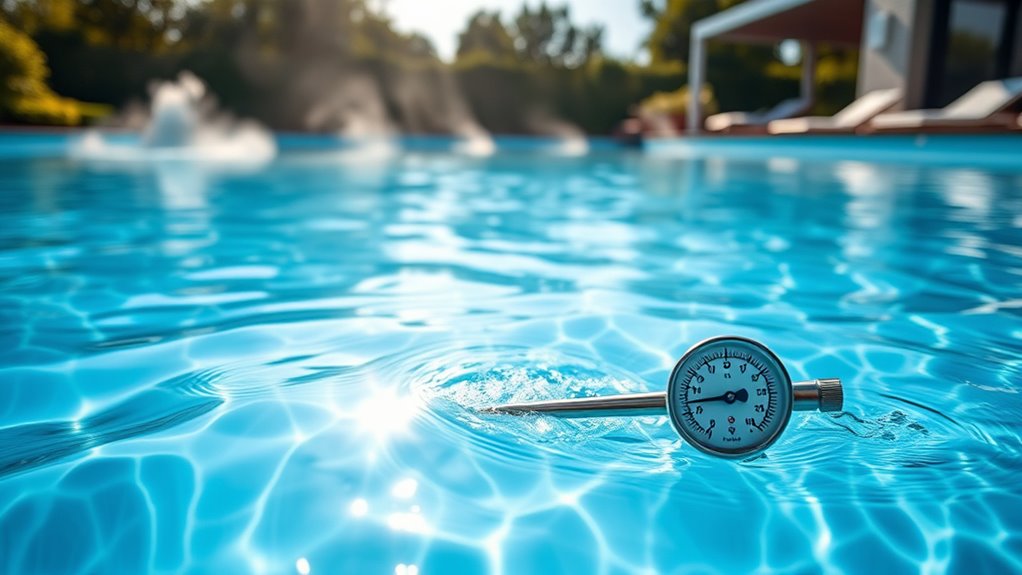
Many believe cold water speeds up muscle recovery, while hot water is thought to improve flexibility. But do these temperature tricks really boost your performance? Let’s clarify what science actually says about these common myths.
Cold Water Enhances Recovery
Cold water is often believed to speed up muscle recovery, but this myth oversimplifies how water temperature affects your body. While hydrotherapy benefits from cold water, it’s not a one-size-fits-all solution. Cold water can reduce inflammation and numb soreness temporarily, but it doesn’t necessarily accelerate overall recovery. Misusing cold water may even hinder muscle repair if overdone. To understand the real effects, consider these points:
- Cold water helps manage swelling but isn’t a substitute for proper rest.
- Water temperature impacts blood flow, influencing recovery time.
- Overexposure to cold may impair muscle regeneration.
- Recognizing the beneficial effects of hydrotherapy can help you use water temperature effectively for recovery, rather than relying solely on cold water myths. Proper hydrotherapy benefits depend on understanding how water temperature interacts with your body’s healing process.
Hot Water Boosts Flexibility
Although hot water is often praised for improving flexibility, this belief oversimplifies how water temperature affects muscle performance. Hydrotherapy techniques suggest that warm water can help relax muscles, but the actual impact depends on proper water temperature regulation. When you immerse yourself in hot water, your muscles may temporarily loosen, making stretching feel easier. However, this isn’t a guarantee of increased flexibility long-term. Overly hot water can also cause discomfort or even injury. To effectively boost flexibility, you need to balance water temperature, ensuring it’s warm enough to promote relaxation without risking harm. Remember, the key lies in controlled water temperature regulation, rather than relying solely on hot water to enhance muscle flexibility. Additionally, understanding AI in Business can help optimize hydrotherapy practices through data analysis and personalized approaches.
The False Idea That Temperature Doesn’t Influence Waterborne Disease Risk
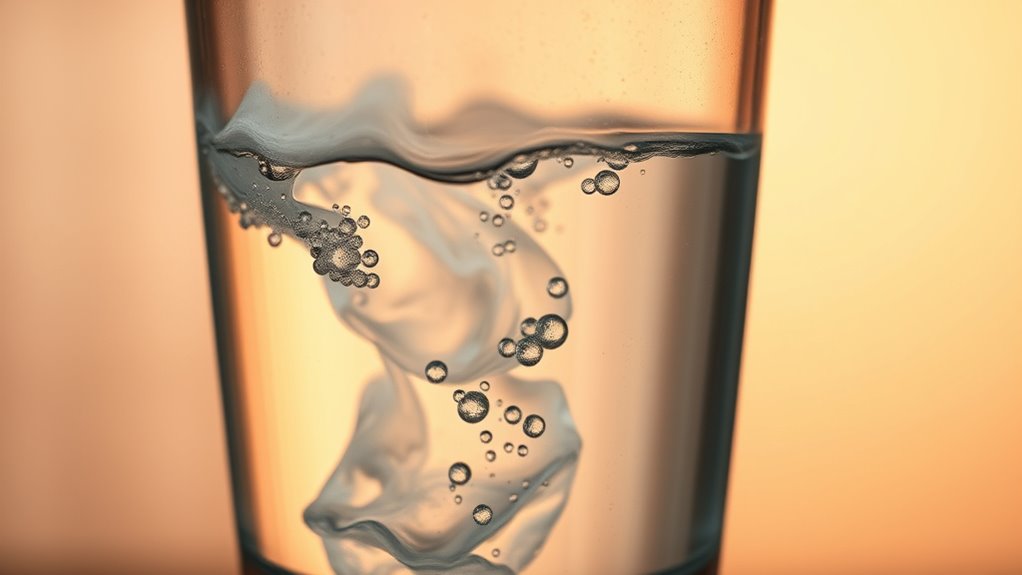
A common misconception is that water temperature has little to no effect on the risk of waterborne diseases. In reality, temperature regulation plays a vital role in controlling waterborne pathogens. Warmer water can promote the growth of harmful microbes, increasing infection risk. Conversely, cooler water can inhibit pathogen proliferation. Proper temperature management is also essential for maintaining indoor water quality, which directly influences health safety standards. Be aware that:
- Waterborne pathogens thrive in certain temperature ranges, making temperature regulation essential for safety.
- Ignoring temperature effects can lead to the rapid growth of bacteria, viruses, and parasites.
- Properly managing water temperature helps reduce disease transmission and protects public health.
Understanding that water temperature influences waterborne disease risk helps you make smarter decisions about safe water practices and treatment, rather than assuming temperature is irrelevant.
The Assumption That Warm Water Is Always Better for Skin and Hair
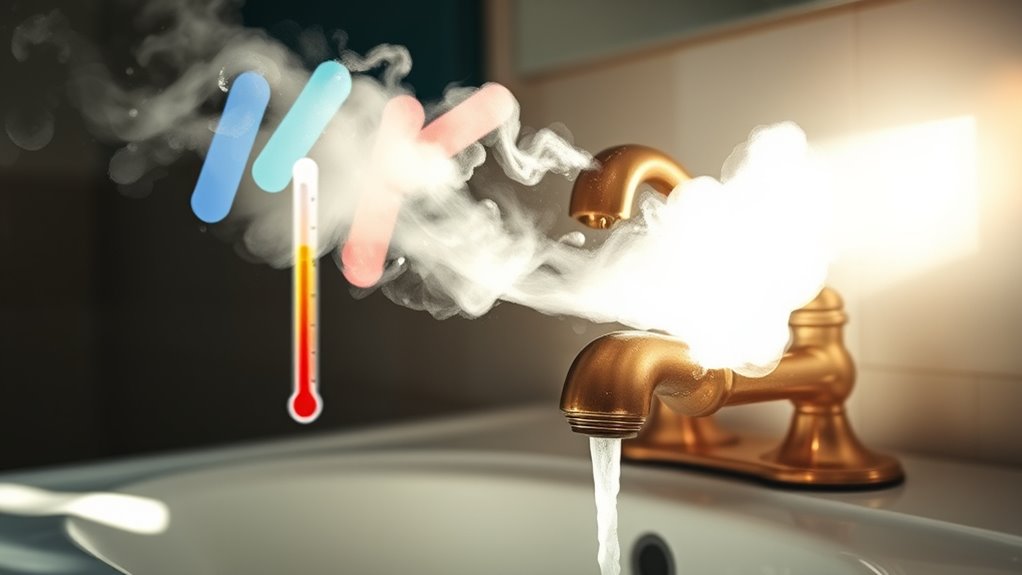
Many people believe that warm water is always better for their skin and hair, but this isn’t necessarily true. Excessively warm water can strip away skin hydration, leaving your skin dry and dull. Similarly, hot water can weaken hair strands, reducing hair health over time. You might think warmth opens pores and improves cleanliness, but it can also damage the skin barrier. Here’s a quick comparison:
| Warm Water Benefits | Potential Drawbacks |
|---|---|
| Enhances cleansing | Dries out skin |
| Opens pores for better absorption | Weakens hair cuticles |
| Relaxes muscles | Causes irritation |
Understanding these facts helps you choose ideal water temperatures for healthier skin and hair. Additionally, being aware of how water temperature influences skin and hair health can guide better bathing habits.
Believing That Temperature Control Doesn’t Impact Comfort During Swimming
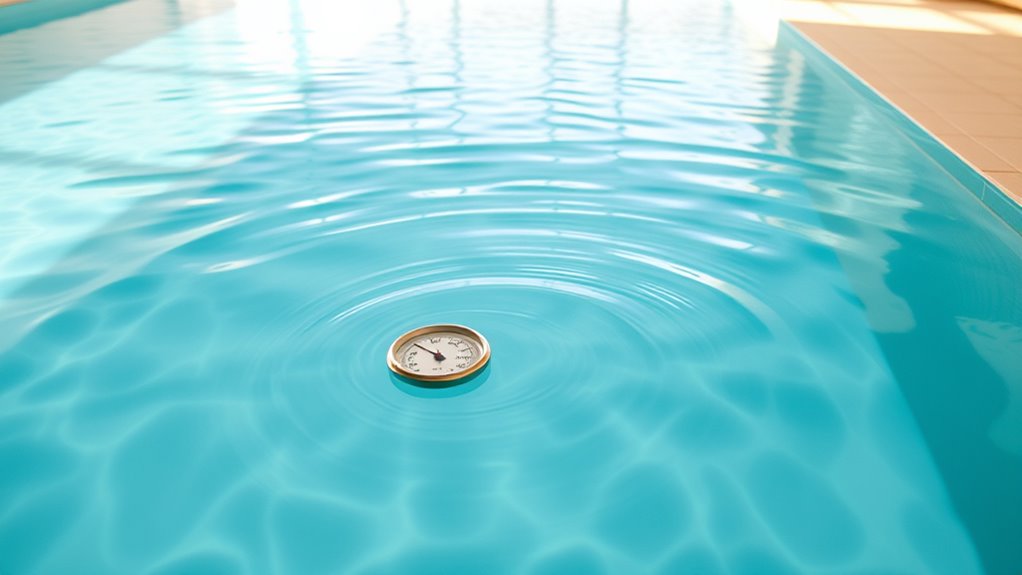
If you think temperature control doesn’t affect your comfort, you might be setting yourself up for discomfort. Even small changes in water temperature can make a big difference in how enjoyable your swim is. Ignoring this can lead to unnecessary chills or overheating, ruining your experience. Proper temperature calibration ensures consistent water conditions, enhancing your overall swimming enjoyment.
Temperature Affects Comfort
Some people believe that water temperature doesn’t really impact how comfortable you feel during a swim, but that’s a misconception. Temperature plays a crucial role in your overall comfort, affecting your stamina and enjoyment. If the water is too cold, you might experience shivering or muscle tightness, making swimming less pleasant. Conversely, overly warm water can cause fatigue and dehydration. To stay comfortable, consider these hydration tips and water purification methods to maintain prime water quality.
- Keeping water at the right temperature enhances your comfort and performance
- Proper hydration prevents cramps and fatigue during swims
- Water purification ensures cleanliness, making your swim safer and more enjoyable
Understanding how temperature influences comfort helps you enjoy swimming more and reduces the risk of discomfort or injury.
Insufficient Control Risks Discomfort
Believing that water temperature doesn’t influence comfort can lead to discomfort and even health risks while swimming. Without proper comfort control, you might find yourself too cold or overheated, impairing your performance and enjoyment. Insufficient control over water temperature ignores how critical it is for overall comfort. To understand this better, consider the following:
| Water Temperature | Comfort Level | Risks |
|---|---|---|
| Too cold (<78°F) | Discomfort, shivering | Hypothermia, muscle stiffness |
| Ideal (78-82°F) | Comfortable | Safe for extended swim |
| Too warm (>82°F) | Overheating, fatigue | Dehydration, heat exhaustion |
Proper comfort control ensures a safe, enjoyable swim, highlighting the importance of managing water temperature effectively.
The Misconception That All Water Temperatures Are Suitable for Everyone
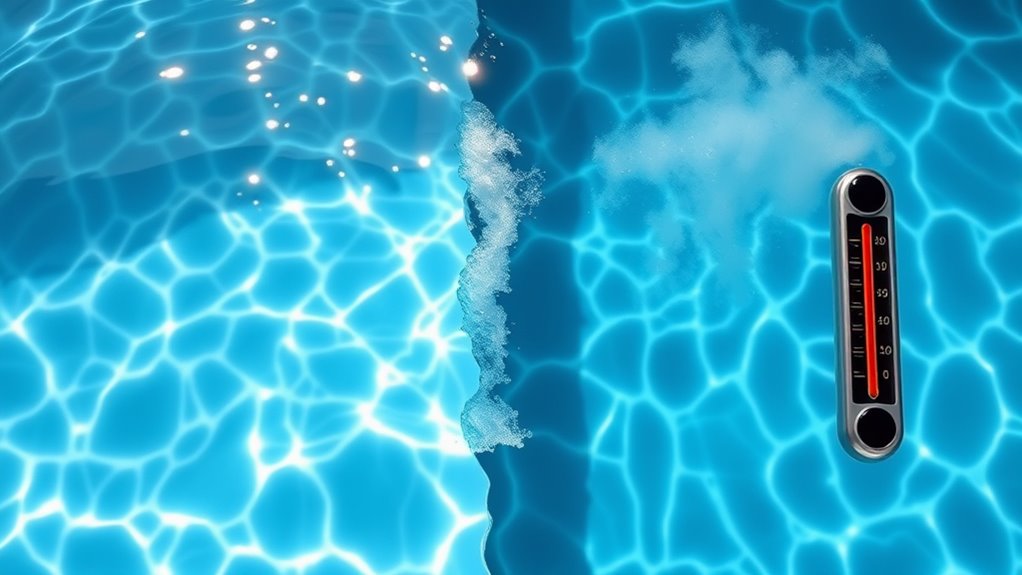
Many assume that any water temperature is safe or comfortable for everyone, but that’s a misconception. Not all water temperatures suit every individual, especially when considering safety guidelines. Your ideal water temperature depends on factors like age, health, and personal tolerance. Ignoring this can lead to discomfort or even health risks. Be aware that:
- Hot water may cause burns or skin irritation for sensitive skin
- Cold water can trigger shock or hypothermia in vulnerable individuals
- Temperatures outside recommended safety guidelines increase risk of accidents
It’s essential to adjust water temperature to your needs and follow established safety guidelines. Just because a certain temperature feels comfortable to one person doesn’t mean it’s safe for everyone. Always prioritize personalized safety when choosing water temperatures.
The Fallacy That Water Temperature Has No Effect on Heart Rate
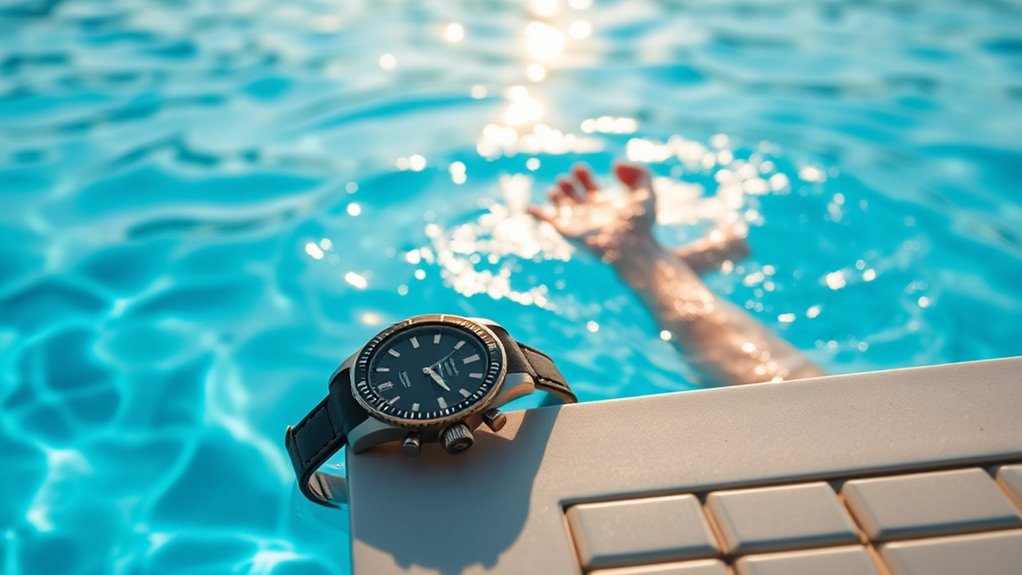
While choosing a safe water temperature is vital for avoiding burns or shock, people often overlook how water temperature can directly influence your heart rate. Hot water causes blood vessels to expand, increasing blood flow and making your heart work harder to circulate blood. Conversely, cold water constricts blood vessels, which can cause your heart rate to slow down initially but may increase strain as your body works to maintain core temperature. Many assume water temperature doesn’t impact heart rate, but it does. Sudden shifts in temperature can stress your cardiovascular system, especially if you have underlying health conditions. Understanding this connection helps you avoid unnecessary strain and guarantees a safer, more comfortable experience in the water.
The Wrong Idea That Temperature Doesn’t Affect Water Evaporation and Dryness
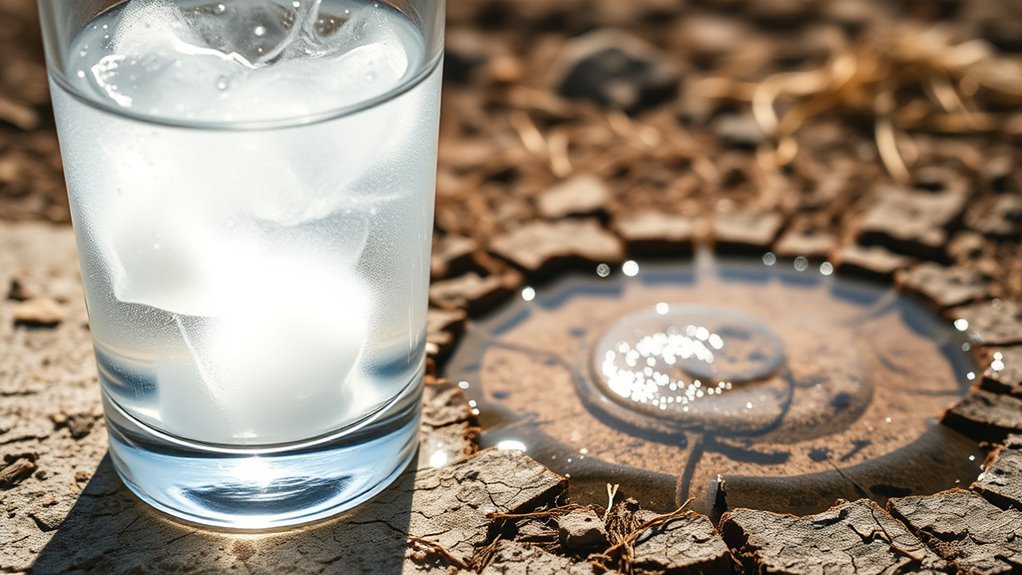
People often assume that water temperature has little effect on evaporation and dryness, but this is a misconception. Warmer water increases the evaporation rate, directly impacting water retention in your skin or environment. When water is hot, it evaporates faster, leading to quicker dryness and dehydration. Conversely, cooler water helps retain moisture longer, reducing evaporation and keeping your skin hydrated.
Be aware of these effects:
- Higher temperatures boost evaporation rate, causing dryness faster
- Cooler water improves water retention, maintaining moisture
- Temperature differences influence how quickly water dries out
Understanding this myth helps you control dryness and hydration better. Temperature isn’t just about comfort; it significantly impacts how water interacts with your body and surroundings.
The Myth That Water Temperature Has No Impact on Energy Expenditure

A common misconception is that water temperature doesn’t influence your energy expenditure, but this isn’t accurate. The temperature impact on water directly affects your body’s effort to regulate heat, impacting overall energy efficiency. When you swim or bathe in colder water, your body works harder to maintain its core temperature, increasing energy expenditure. Conversely, warmer water requires less effort, conserving energy. Ignoring this connection can lead to ineffective training or recovery strategies. Understanding how water temperature influences your body’s energy use helps you optimize performance and efficiency. By choosing the right water temperature, you can better manage energy expenditure, making your activities more effective and aligned with your fitness goals. Don’t underestimate the role temperature plays in your overall energy efficiency.
The Belief That Water Temperature Doesn’t Influence Immune Response
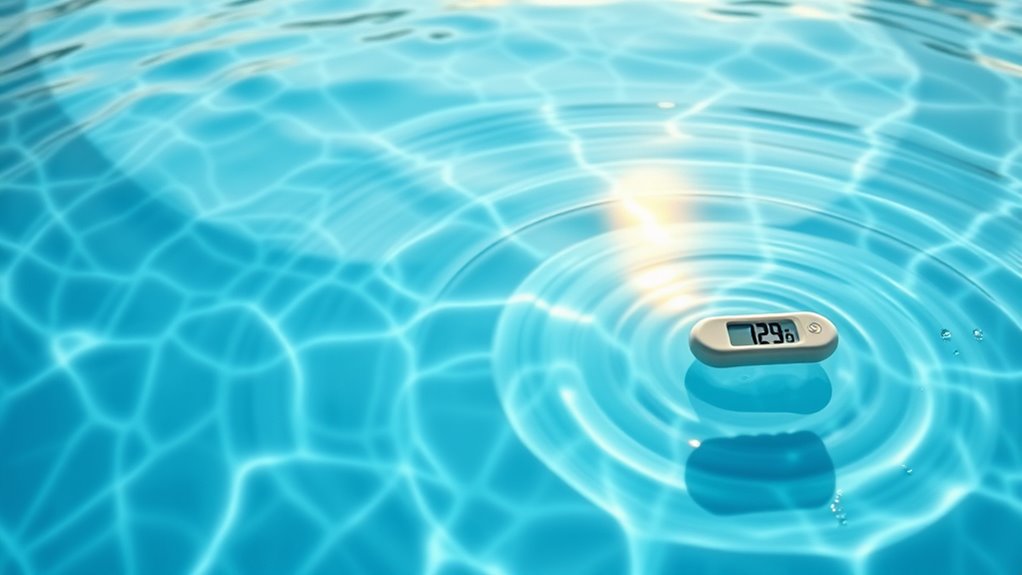
Many people believe water temperature doesn’t affect your immune response, but that’s not entirely true. Cold water can temporarily stress your body, potentially weakening immunity, while warm water may help relax muscles and support recovery. Understanding how water impacts immunity helps you make better choices for your health.
Water’s Impact on Immunity
Does water temperature really affect your immune system? Yes, it can influence your body’s ability to maintain ideal hydration habits and support water temperature regulation. When water is too cold or too hot, your body works harder to stabilize core temperature, which can affect immune responses. Proper water temperature helps your body absorb fluids efficiently, keeping your immune defenses strong.
Consider these points:
- Warm water may promote better hydration and circulation.
- Cold water can cause temporary stress, impacting immune function.
- Consistent water temperature supports overall hydration habits, essential for immune health.
Cold Water Effects
Is it true that cold water doesn’t impact your immune response? Not necessarily. Cold water can influence your immune system by affecting hydration strategies and overall water clarity. When you immerse yourself in cold water, your body responds by constricting blood vessels, which can temporarily reduce immune cell circulation. This may make you more vulnerable to illnesses if you’re not properly hydrated or if water clarity is compromised with impurities. Drinking cold water during or after cold exposure helps maintain hydration, supporting immune function. However, repeatedly exposing yourself to very cold water without proper preparation can stress your body, potentially weakening your immune defenses over time. Recognizing how cold water affects your body emphasizes the importance of controlled exposure and mindful hydration.
Warm Water Benefits
Although some believe water temperature doesn’t affect your immune response, warm water can actually offer notable benefits. It enhances circulation, helping your immune system function more efficiently. Warm water also promotes relaxation, reducing stress that can weaken immunity. Additionally, during aquatic therapy, warm water eases muscle tension and improves mobility, supporting overall health.
- Boosts circulation for better immune response
- Promotes relaxation and stress relief
- Enhances muscle recovery and flexibility
These benefits show that water temperature plays a pivotal role in supporting your immune system. Choosing warm water for activities like aquatic therapy isn’t just about comfort—it’s about optimizing your health and recovery. Don’t underestimate the power of water temperature in strengthening your body’s defenses.
The False Notion That Temperature Doesn’t Play a Role in Water Safety Protocols
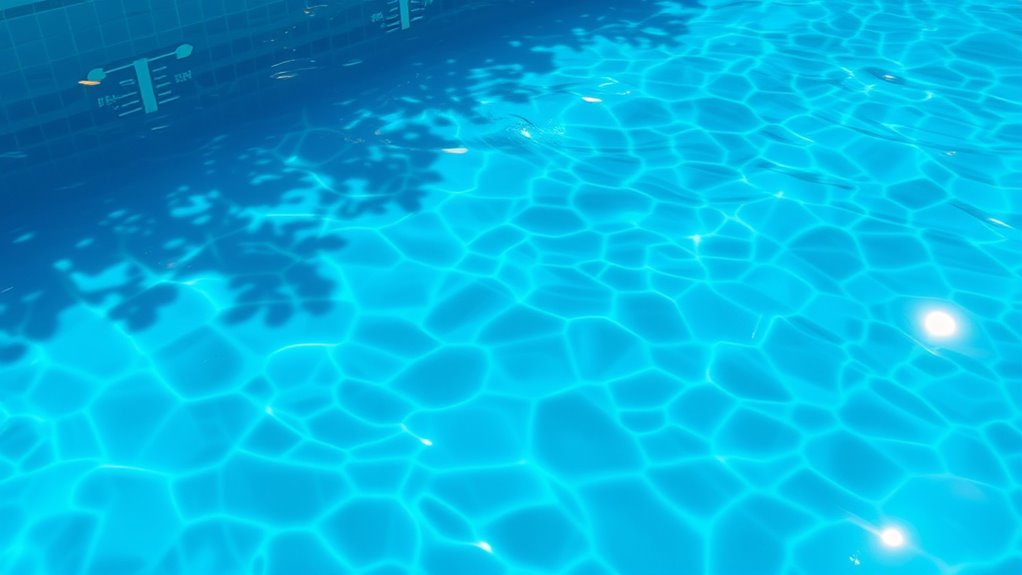
Many people believe that water temperature has little to no impact on safety protocols, but this is a dangerous misconception. Temperature plays a vital role in maintaining water quality, as warmer water can promote bacterial growth, increasing health risks. Conversely, colder water can inhibit microbial activity, helping prevent contamination. Ignoring temperature’s influence can compromise water safety standards, especially in swimming pools and public water systems. Additionally, water aesthetics are affected by temperature, as warmer water may encourage algae or unpleasant odors, signaling potential safety issues. Proper regulation of water temperature ensures not only comfort but also safety, reducing the chance of waterborne illnesses. Dismissing temperature’s role leads to overlooked risks and ineffective safety measures. Understanding and controlling water temperature is essential for safeguarding health and guaranteeing water remains safe and inviting.
The Misunderstanding That Water at Any Temperature Is Equally Effective for Therapy
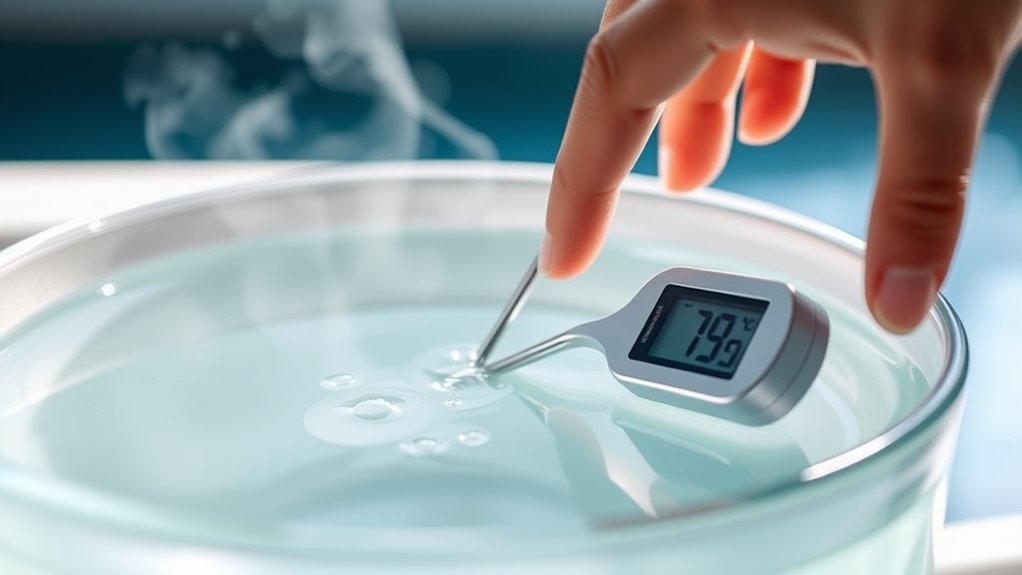
People often assume that water temperature doesn’t substantially affect its therapeutic benefits, but this is a misconception. The reality is that water temperature significantly influences therapy effectiveness. Different temperatures target specific outcomes, such as reducing inflammation or relaxing muscles.
You should consider:
- Hot water enhances blood flow and relaxes muscles.
- Cold water reduces swelling and numbs pain.
- Warm water promotes circulation and alleviates stiffness.
Choosing the right water temperature can make or break your therapy results. Using water that’s too hot or cold for your needs may diminish benefits or cause discomfort. Understanding how water temperature impacts therapy effectiveness helps you optimize your treatment and avoid ineffective or harmful practices.
The Assumption That Water Temperature Is Irrelevant for Children and Elderly Safety

While understanding how water temperature affects therapy outcomes is important, it’s equally essential to recognize that temperature safety is especially critical for children and the elderly. You might assume that water temperature doesn’t matter for these groups, but incorrect assumptions can lead to serious risks. For children, their delicate skin and developing bodies make them more vulnerable to burns or hypothermia if water is too hot or too cold. For the elderly, fragile skin and compromised health increase the danger of burns and other temperature-related injuries. Ensuring proper water temperature helps protect child safety and supports elderly health. Never underestimate the importance of adjusting water temperature appropriately for these vulnerable populations to prevent injuries and promote safe, effective therapy.
Frequently Asked Questions
How Does Water Temperature Affect Swimming Endurance and Stamina?
You’ll find that water temperature directly impacts your swimming endurance and stamina improvement. Warmer water helps your muscles relax and reduces fatigue, allowing you to swim longer without exhaustion, thereby enhancing endurance. Conversely, cooler water can boost circulation and mental alertness, but may tire you faster if too cold. Maintaining ideal water temperature balances comfort and performance, giving you the best chance for endurance enhancement during your swim sessions.
Can Water Temperature Influence Mental Relaxation Beyond Physical Comfort?
Yes, water temperature can influence your mental relaxation beyond just physical comfort. When you swim in comfortably warm water, it promotes mindfulness benefits by helping you focus on your breath and movements, which can enhance emotional calming. Cooler water might sharpen your awareness and reduce stress, fostering mental clarity. Ultimately, the right temperature creates a peaceful environment that supports both emotional well-being and mindfulness benefits during your swim.
What Are the Safety Considerations for Children and Elderly Regarding Water Temperature?
You should always prioritize child safety and elderly precautions when managing water temperature. Keep hot water below 120°F (49°C) to prevent burns, especially for children and seniors with sensitive skin. Test water temperatures before use, install anti-scald devices, and supervise children closely around water. For the elderly, ensure easy access and avoid sudden temperature changes. Staying vigilant about water temperature helps safeguard vulnerable groups from burn injuries and enhances safety.
How Does Water Temperature Impact the Effectiveness of Hydrotherapy Treatments?
You’ll find that water temperature regulation directly influences hydrotherapy outcomes; studies show ideal temperatures boost healing by up to 30%. Warmer water, around 92-96°F, relaxes muscles and promotes circulation, enhancing treatment effectiveness. Cooler water, 78-86°F, reduces inflammation and swelling. By carefully adjusting water temperature, you maximize therapeutic benefits, ensuring your hydrotherapy sessions are tailored to your specific needs, leading to faster recovery and better overall results.
Are There Long-Term Health Effects Associated With Consistently Swimming in Certain Water Temperatures?
Swimming in specific water temperatures consistently can impact your long-term health. Cold water may strengthen your immune system and improve circulation, but prolonged exposure could lead to issues like hypothermia or respiratory problems. Conversely, warm water relaxes muscles but might cause skin irritations or dehydration if overused. Being mindful of water temperature and duration helps prevent potential long-term health effects and supports your overall well-being.
Conclusion
Don’t let myths cloud your understanding of water temperature. Think of it as a delicate dance, where each step influences your health and safety. When you know the facts, you can navigate the waters confidently, avoiding the rocks of misinformation. Remember, just like a skilled sailor reads the currents, you should respect water’s power and influence. Master the truth, and you’ll sail smoothly through every splash and soak.
